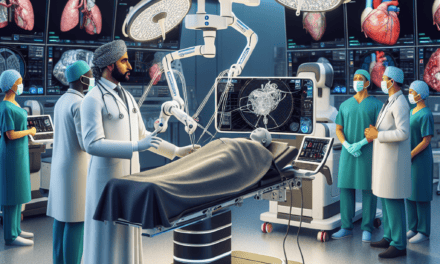Transforming Post-Surgery Recovery: The Impact of AI
In recent years, artificial intelligence (AI) has emerged as a transformative force across various sectors, including healthcare. One of the most significant areas where AI is making a profound impact is in post-surgery recovery. The integration of AI technologies into recovery protocols is not only enhancing patient outcomes but also streamlining processes for healthcare providers. This article delves into the multifaceted ways AI is revolutionizing post-surgery recovery, exploring its applications, benefits, challenges, and future potential.
1. Understanding AI in Healthcare
Before diving into the specifics of AI’s role in post-surgery recovery, it is essential to understand what AI entails in the context of healthcare. AI refers to the simulation of human intelligence processes by machines, particularly computer systems. These processes include learning, reasoning, and self-correction. In healthcare, AI can analyze vast amounts of data, recognize patterns, and make predictions, which can significantly enhance patient care.
AI technologies in healthcare can be categorized into several types:
- Machine Learning: Algorithms that improve automatically through experience and data.
- Natural Language Processing (NLP): The ability of machines to understand and interpret human language.
- Robotics: Automated systems that can assist in surgical procedures and rehabilitation.
- Predictive Analytics: Tools that analyze historical data to predict future outcomes.
These technologies are increasingly being integrated into various stages of patient care, including diagnosis, treatment planning, and recovery. The focus of this article is on the recovery phase, where AI is proving to be particularly beneficial.
2. Personalized Recovery Plans
One of the most significant advantages of AI in post-surgery recovery is its ability to create personalized recovery plans tailored to individual patient needs. Traditional recovery protocols often follow a one-size-fits-all approach, which may not be effective for every patient. AI can analyze a patient’s medical history, surgical details, and recovery progress to develop a customized plan that optimizes healing.
For instance, AI algorithms can assess factors such as:
- Age and overall health status
- Type of surgery performed
- Pre-existing medical conditions
- Genetic predispositions
By considering these variables, AI can recommend specific rehabilitation exercises, dietary adjustments, and medication regimens that align with the patient’s unique circumstances. A study published in the journal Nature Medicine demonstrated that patients who followed AI-generated recovery plans experienced a 30% faster recovery rate compared to those on standard protocols.
Moreover, AI can continuously monitor a patient’s recovery through wearable devices and mobile applications. These tools can track vital signs, activity levels, and pain scores, providing real-time data to healthcare providers. If a patient deviates from the expected recovery trajectory, the AI system can alert the medical team, allowing for timely interventions.
3. Enhanced Monitoring and Support
Post-surgery recovery often involves a significant amount of monitoring to ensure that patients are healing properly and to identify any complications early. AI technologies are enhancing this monitoring process through advanced data analytics and remote patient monitoring systems.
Wearable devices equipped with AI capabilities can track various health metrics, including:
- Heart rate and rhythm
- Blood pressure
- Oxygen saturation levels
- Physical activity and mobility
These devices can provide continuous feedback to both patients and healthcare providers. For example, a patient recovering from knee surgery can wear a smart device that monitors their range of motion and activity levels. If the device detects that the patient is not moving as much as expected, it can send alerts to the healthcare team, prompting them to intervene.
Additionally, AI-powered chatbots and virtual assistants are becoming increasingly popular in post-surgery care. These tools can provide patients with 24/7 support, answering questions about their recovery, reminding them to take medications, and offering guidance on rehabilitation exercises. A study conducted by the University of California found that patients who interacted with AI chatbots reported higher satisfaction levels and felt more supported during their recovery process.
4. Predicting Complications and Readmissions
One of the critical challenges in post-surgery recovery is the risk of complications and readmissions. AI is playing a pivotal role in predicting these risks, allowing healthcare providers to take proactive measures to mitigate them.
Machine learning algorithms can analyze historical data from previous surgeries to identify patterns associated with complications. For example, factors such as surgical technique, patient demographics, and post-operative care practices can all influence recovery outcomes. By analyzing this data, AI can develop predictive models that estimate a patient’s risk of complications based on their specific circumstances.
For instance, a study published in the journal JAMA Surgery demonstrated that an AI model could accurately predict which patients were at the highest risk of developing infections after surgery. By identifying these patients early, healthcare providers could implement targeted interventions, such as more frequent monitoring or preventive antibiotics, to reduce the likelihood of complications.
Furthermore, AI can help reduce hospital readmissions, which are a significant concern for healthcare systems. According to the Centers for Medicare & Medicaid Services (CMS), nearly 20% of Medicare patients are readmitted within 30 days of discharge. AI algorithms can analyze a patient’s risk factors and provide recommendations for post-discharge care, such as follow-up appointments or home health services, to ensure a smoother transition back to daily life.
5. Ethical Considerations and Challenges
While the benefits of AI in post-surgery recovery are substantial, there are also ethical considerations and challenges that must be addressed. As AI systems become more integrated into healthcare, issues related to data privacy, algorithmic bias, and the potential for over-reliance on technology must be carefully considered.
Data privacy is a significant concern, as AI systems often require access to sensitive patient information. Healthcare providers must ensure that they comply with regulations such as the Health Insurance Portability and Accountability Act (HIPAA) to protect patient data. Additionally, patients should be informed about how their data will be used and have the option to opt-out of data collection if they choose.
Algorithmic bias is another critical issue. AI systems are only as good as the data they are trained on. If the training data is not representative of the diverse patient population, the algorithms may produce biased results, leading to disparities in care. For example, an AI model trained primarily on data from one demographic group may not perform well for patients from different backgrounds.
Finally, there is the risk of over-reliance on AI technologies. While AI can provide valuable insights and support, it should not replace the human touch in healthcare. Healthcare providers must strike a balance between leveraging AI tools and maintaining the essential elements of patient care, such as empathy and communication.
Conclusion
The integration of AI into post-surgery recovery is transforming the way patients heal and healthcare providers deliver care. From personalized recovery plans to enhanced monitoring and predictive analytics, AI is proving to be a valuable ally in improving patient outcomes and streamlining recovery processes. However, as with any technological advancement, it is crucial to address the ethical considerations and challenges that accompany AI’s implementation in healthcare.
As we look to the future, the potential for AI in post-surgery recovery is vast. Continued research and development will likely lead to even more innovative solutions that enhance patient care and improve recovery experiences. By embracing these advancements while remaining vigilant about ethical considerations, the healthcare industry can harness the power of AI to create a more effective and compassionate recovery process for all patients.





